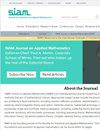Homogenization for a Variational Problem with a Slip Interface Condition
IF 2.1
4区 数学
Q1 MATHEMATICS, APPLIED
引用次数: 0
Abstract
SIAM Journal on Applied Mathematics, Volume 83, Issue 6, Page 2390-2417, December 2023.Abstract. Inspired by applications, we study the effect of interface slip on the effective wave propagation in poroelastic materials, which are composites consisting of elastic frames whose pore space is filled with fluid. The current literature on the homogenization for the poroelastic wave equations are all based on the no-slip interface condition posed on the microscale. However, for certain pore fluids, the no-slip condition is known to be physically invalid. In the literature, slip boundary conditions have been considered for porous materials with rigid solid frames. For these rigid porous materials, the wave can only propagate in the pore fluid and hence the equations for the microscale are posed only in the pore space. Consequently, the slip on the interface involves only the fluid velocity and the fluid stress. In contrast, for poroelastic materials, the wave can propagate not only in the pore fluid but also in the solid frame; hence the slip conditions involve the velocities on both sides of the interface, rather than just the fluid side. With this slip condition, a variational boundary value problem governing the small vibrations of a periodic mixture of an elastic solid and a slightly viscous fluid is studied in this paper. The method of two-scale convergence is used to obtain the macroscopic behavior of the solution and to identify the role played by the slip interface condition.
一类具有滑移界面条件的变分问题的均匀化
应用数学学报,83卷,第6期,2390-2417页,2023年12月。摘要。受实际应用的启发,我们研究了界面滑移对孔隙弹性材料中有效波传播的影响。孔隙弹性材料是由弹性框架组成的,其孔隙空间充满流体。目前关于孔隙弹性波动方程均质化的文献都是基于微尺度上的无滑移界面条件。然而,对于某些孔隙流体,已知无滑移条件在物理上是无效的。在文献中,滑移边界条件已考虑与刚性实体框架多孔材料。对于这些刚性多孔材料,波只能在孔隙流体中传播,因此微尺度方程只能在孔隙空间中建立。因此,界面上的滑移只涉及流体速度和流体应力。相反,对于孔隙弹性材料,波不仅可以在孔隙流体中传播,而且可以在固体框架中传播;因此,滑移条件涉及界面两侧的速度,而不仅仅是流体一侧。在此滑移条件下,本文研究了弹性固体与微粘性流体周期性混合物的小振动变分边值问题。采用双尺度收敛的方法得到了解的宏观行为,并确定了滑移界面条件对解的影响。
本文章由计算机程序翻译,如有差异,请以英文原文为准。
求助全文
约1分钟内获得全文
求助全文
来源期刊
CiteScore
3.60
自引率
0.00%
发文量
79
审稿时长
12 months
期刊介绍:
SIAM Journal on Applied Mathematics (SIAP) is an interdisciplinary journal containing research articles that treat scientific problems using methods that are of mathematical interest. Appropriate subject areas include the physical, engineering, financial, and life sciences. Examples are problems in fluid mechanics, including reaction-diffusion problems, sedimentation, combustion, and transport theory; solid mechanics; elasticity; electromagnetic theory and optics; materials science; mathematical biology, including population dynamics, biomechanics, and physiology; linear and nonlinear wave propagation, including scattering theory and wave propagation in random media; inverse problems; nonlinear dynamics; and stochastic processes, including queueing theory. Mathematical techniques of interest include asymptotic methods, bifurcation theory, dynamical systems theory, complex network theory, computational methods, and probabilistic and statistical methods.

 求助内容:
求助内容: 应助结果提醒方式:
应助结果提醒方式:


